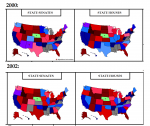Jackson Lennock
Well-known member
What if the DUI hadn't come out just before the 2000 Election and Bush wins by a clear margin - thus avoiding the drawn out Florida fight and Bush v. Gore?
New Mexico, Wisconsin, Iowa, and Oregon were all under 1% for Gore, and Florida would clearly be in the Republican column here. Minnesota (2.4%) and Maine's Second District (1.87%) could also go for Bush if just 1.25% of voters go the other way here.
Instead of a 50-50 Senate, there'd be at least a 51-49 Senate. Slade Gorton (R) lost to Maria Cantwell (D) by 0.09%. Even if you think coattails don't make much of a difference, that's a narrow enough margin that I think there would be some benefit to Gorton. Other close races OTL were Michigan (1.6%), Missouri (2.1%), Nebraska (2.3%), and New Jersey (3.0%).
A few immediate thoughts...
New Mexico, Wisconsin, Iowa, and Oregon were all under 1% for Gore, and Florida would clearly be in the Republican column here. Minnesota (2.4%) and Maine's Second District (1.87%) could also go for Bush if just 1.25% of voters go the other way here.
Instead of a 50-50 Senate, there'd be at least a 51-49 Senate. Slade Gorton (R) lost to Maria Cantwell (D) by 0.09%. Even if you think coattails don't make much of a difference, that's a narrow enough margin that I think there would be some benefit to Gorton. Other close races OTL were Michigan (1.6%), Missouri (2.1%), Nebraska (2.3%), and New Jersey (3.0%).
A few immediate thoughts...
- Without the election being drawn out, the Bush transition might go more smoothly. They might prevent 9/11 if they aren't as distracted and rushed in setting up the administration.
- Less liberal ire directed at the Supreme Court
- More blame would be put on Gore for losing, rather than Ralph Nader or the Supreme Court. Nader might still get flack depending on what the margin is. The brief surge in interest in third parties (Perot-Perot-Nader) might not fade without Nader being seen as a spoiler; and progressives might argue harder that if Gore had been more progressive, he'd have gotten more votes and won.
- Many democrats will still say Bush wasn't the moral winner if the DUI comes out after Bush wins; they'll argue that Bush would have lost if people had known
- Bush probably wins the popular vote, which helps a bit with legitimacy
- Rehnquist and O'Connor probably retire in W's first first term without Bush v. Gore.


